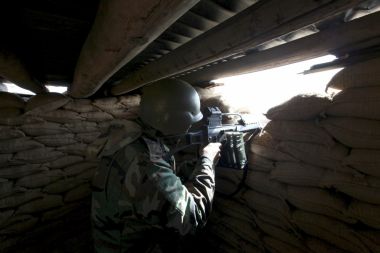US and Iraq plan summer offensive to retake Mosul from Islamic State

The United States and Iraq have started preparing for an offensive by summer to recapture the Iraqi city of Mosul, which was taken by Islamic State militants last June, the Wall Street Journal reported on Thursday.
Preparations include selecting and training military units for the planned assault and cutting supply lines to Islamic State fighters, General Lloyd Austin, head of the US military's Central Command, told the Journal.
Mosul is the largest city in a self-declared Islamic State caliphate straddling the border between northern Iraq and eastern Syria.
A senior Iraqi official told Reuters in November that Mosul was the focus of government efforts to defeat Islamic State, because of the city's size and symbolic status.
The US-led forces have been conducting air strikes against Islamic State targets in Iraq and Syria, including 16 since Wednesday that were centred on Mosul.
The Journal quoted Austin as saying that Iraqi forces must be ready before the offensive could begin.
"If we did things alone or with some of the other allies on the ground, it could move faster," he told the newspaper. "But the Iraqis have to do this themselves."
Austin said he had not yet determined whether to recommend that US ground troops accompany local units pushing into Mosul but added the military would "do what it takes," the Journal said.
He told the paper that two Iraqi divisions were expected to lead the force fighting to retake Mosul. The newspaper quoted military officials as saying those forces would receive four to six weeks of US training.
The Vatican's diplomatic representative in Iraq said this week that he believe Christians driven out of northern Iraq by Islamic State might be able to return to their homes this year.
Archbishop Giorgio Lingua told a representative of Roman Catholic charity Aid to the Church in Need that he was cautiously optimistic but that the process would be very challenging.
"If they do return it won't be easy," he said. "Besides the reconstruction of destroyed houses and infrastructure, such as schools, it will be necessary first and foremost to restore the trust in Muslim neighbours which has also been shattered.
"Many Christians feel their neighbours betrayed them, because they looted their [abandoned] houses. So it will not only be necessary to repair homes, but also relationships."
Archbishop Lingua said that the position of Christians in Iraq depended on how the Government handed the crisis in Mosul and the Nineveh Plain.
"If the government manages to regain control there and implements a campaign of national reconciliation, then there will be a place for Christians in Iraq. If clashes persist, however, the weakest will pay the price, and these are always the minorities. We therefore have to hope that peace will return. This is where the international community comes in."
Additional reporting by Reuters.











